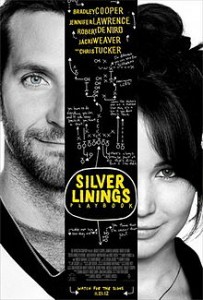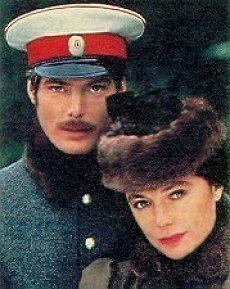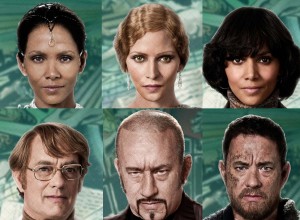Silver Linings Playbook
Posted on November 15, 2012 at 6:01 pm
B+| Lowest Recommended Age: | Mature High Schooler |
| MPAA Rating: | Rated R for language and some sexual content/nudity |
| Profanity: | Constant very strong language |
| Alcohol/ Drugs: | Drinking |
| Violence/ Scariness: | Assaults and fighting |
| Diversity Issues: | Respectful treatment of mental illness |
| Date Released to Theaters: | November 16, 2012 |
| Date Released to DVD: | April 29, 2013 |
| Amazon.com ASIN: | B00A81NFAS |
When Bradley Cooper appeared on “Inside the Actors Studio,” the first graduate of the program to be featured, they showed a clip from Robert DeNiro’s appearance on the show, with then-student Cooper asking him a question about his performance in “Awakenings.” DeNiro was clearly impressed with the perception and sincerity of his young questioner. It was only a few years later that Cooper was acting opposite DeNiro in “Limitless.” Now they are together again as father and son, Pat Sr. and Pat Jr., in “Silver Linings Playbook,” based on the novel by Matthew Quick.
Pat Jr. has been in a mental hospital being treated for bipolar disorder, the result of a plea bargain following “the incident,” we will only learn the details of later. His mother brings him home though it is not at all clear that he is or will ever be ready. Pat has impulse control problems, especially when he hears a particular Stevie Wonder song or does not like the ending of a Hemingway novel. But he is absolutely determined to get his life back. And his wife back. This involves a lot of physical conditioning and finding away around the restraining order that forbids him from contacting her.
He meets a troubled young widow named Tiffany (Jennifer Lawrence of “Hunger Games”), the sister-in-law of his best friend. Pat is fighting so hard to be “normal” again that he is disturbed, annoyed, and a little scared by her outspoken, socially inappropriate behavior. But she offers the same directness and shared experience he had with his fellow patients. He struggles with the competing impulses to reject and accept her overtures of friendship. Their exchange about the effects of various mood and anti-psychotic meds is a gem, the mental illness equivalent of Romeo and Juliet speaking to each other in alternate lines of a sonnet on their first meeting. And Lawrence is sublime in her summation-to-the-court-style argument with Pat Sr. about the factors that go into an Eagles win.
They agree to help each other, and this gives Pat purpose, discipline, and direction. And we learn more about “the incident” and about Pat’s relationship with Pat Sr., a professional gambler and bookie whose passion for the Eagles provides some context for his influence on his son.
Director David O. Russell, who adapted the novel, and his cast fill the story with engaging, believable characters, especially Jackie Weaver as Pat’s mother, John Ortiz as his stressed-out best friend, and Anupam Kuhr as his therapist. It is a great pleasure to see Chris Tucker, who is outstanding as a mental patient, though I wish they had found him more to do than the usual “black it up” (that’s a direct quote) pep talk. Pat is so upset by the end of Farewell to Arms (on his wife’s assigned reading list for the high school class she teaches) that he has to wake his parents in the middle of the night to tell them why stories need happy endings. The ending here is abrupt and a bit cheesy. But these damaged and vulnerable and anxious characters love and want to be loved and we want it for them.
Parents should know that this film includes a lot of very strong and profane language, sexual references (some explicit), family dysfunction and mental illness, drinking
Family discussion: How are Pat and his father alike? How do Tiffany, Ronnie, and Cliff help him? What makes Pat change his mind?
If you like this, try: “Inside Moves” and “Garden State”





